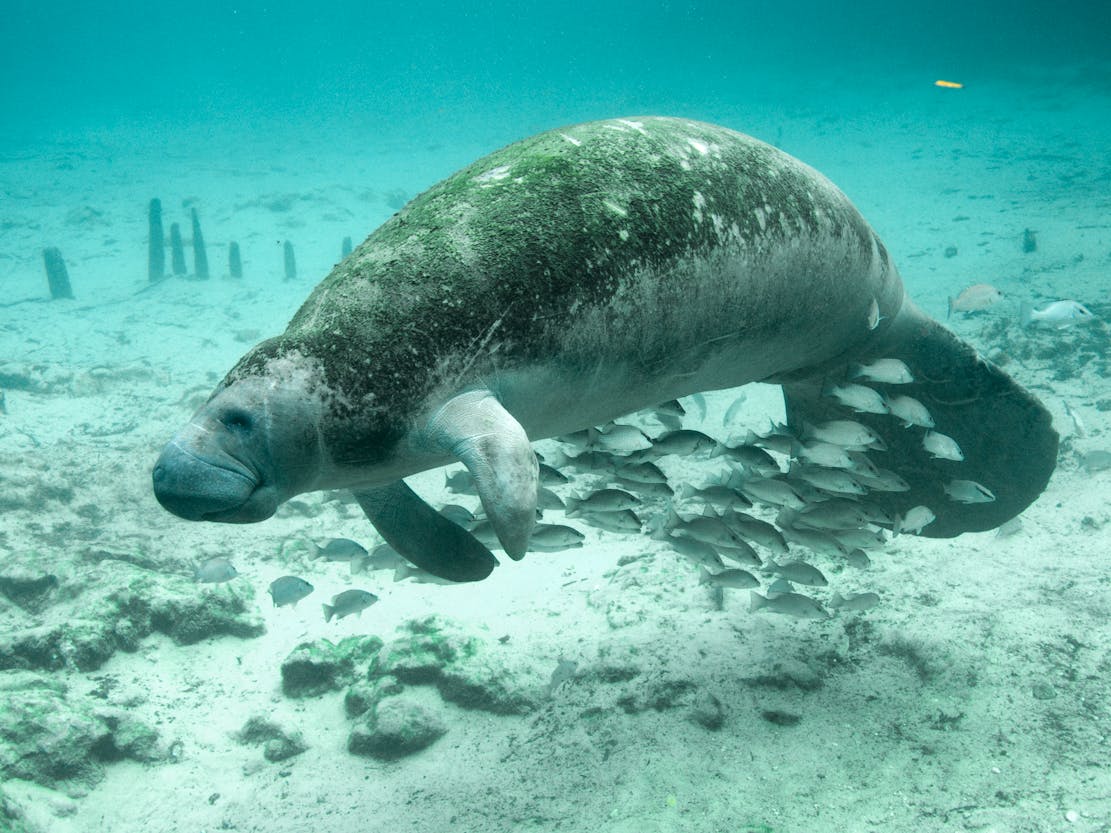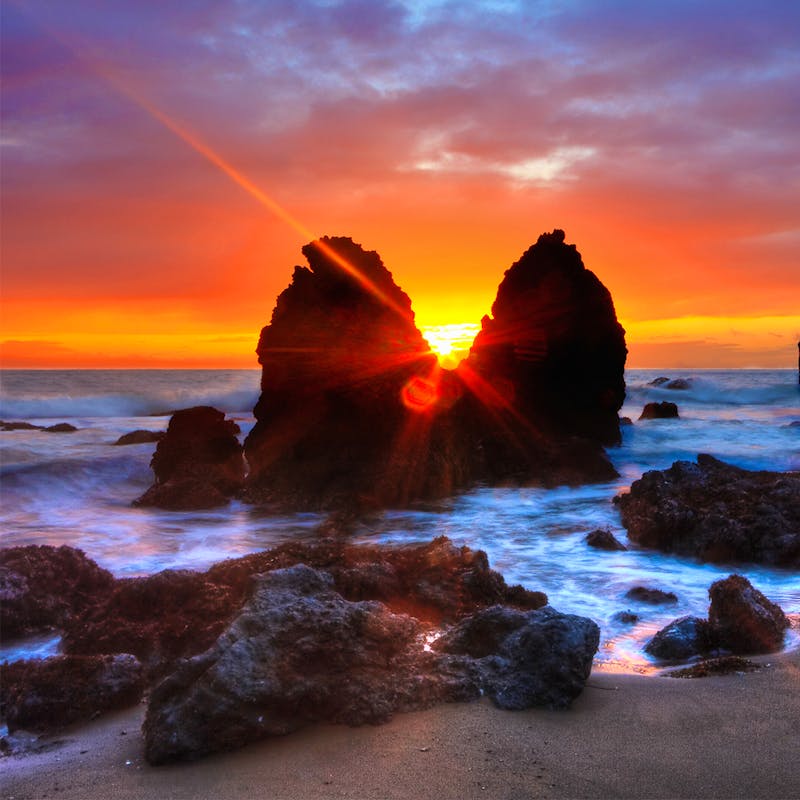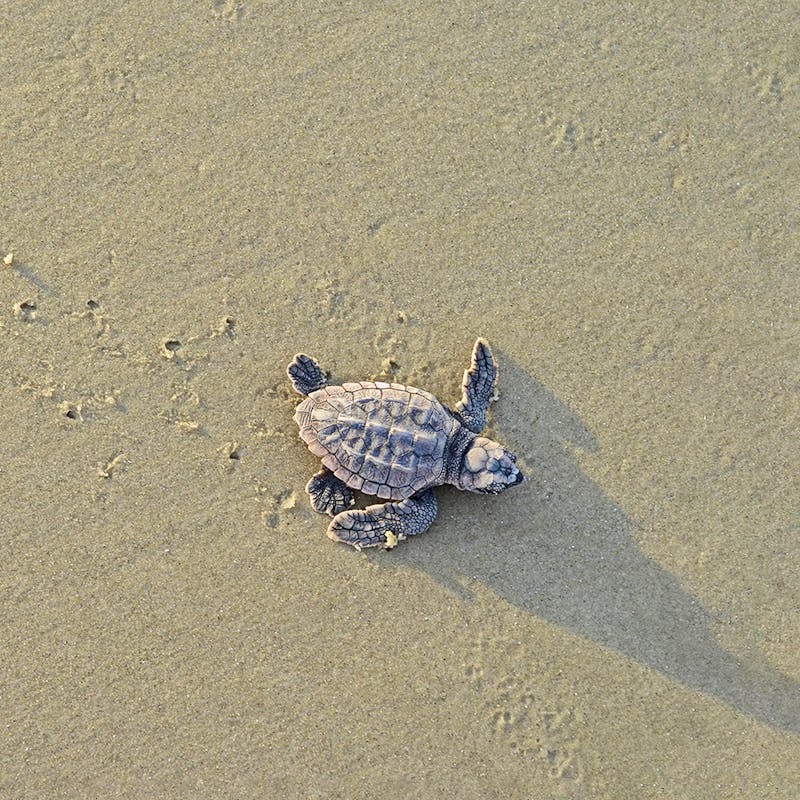Join our mobile Rapid Response Network!
You can be the first to hear about how we’re going to hold this administration accountable and how you can fight back for wildlife!
The Florida manatee, Florida’s state marine mammal, is a large aquatic relative of the elephant.
Manatees are grayish brown in color and have thick, wrinkled skin on which there is often a growth of algae. Their front flippers help them steer or sometimes crawl through shallow water. They also have powerful, flat tails that help propel them through the water.
Like other grazing animals, Florida manatees play an important role in influencing plant growth in the shallow rivers, bays, estuaries, canals and coastal waters they call home.
Why are Florida manatees threatened?
Overhunting of manatees in the past is thought to have been the original threat. Ever since, however, manatees have faced various challenges, most notably habitat loss.
Whether natural or man-made, manatees depend on warm waters to survive the coldest days of winter. In Florida, manatees historically relied on Florida’s has high concentration of natural artesian springs. Today, however, many springs have been altered, degraded or even lost completely due to groundwater pumping for urban and agricultural development, being drowned under reservoirs or blocked by dams. At the same time, coastal power plants that have been built produce artificial sources of warm water, leading over 60% of the manatee population to rely on these waters to survive the winter.
Most recently, pollution-fueled loss of their major food source, seagrasses, caused a large-scale manatee die-off which began in the winter of 2020-2021. As a result, federal agencies declared an Unusual Mortality Event along much of Florida’s Atlantic coast with the Indian River Lagoon as the epicenter. 2021 was the deadliest year for Florida manatees ever documented with 1,101 deaths recorded. With the situation stabilizing, federal agencies officially closed the UME in March 2015.
You can be a part of the solution for endangered species: support our efforts to protect the wild!
Manatees face many threats including habitat loss, collisions with boats, human harassment, entrapment in water control structures, gear entanglement and others. Natural warm-water habitat loss (like springs), red tide and harmful algal blooms, pollution-fueled loss of their major food source (seagrasses) and climate change are major long-term threats.

Defenders' Impact
In the late 1990s, Defenders was a lead plaintiff in federal lawsuits against the U.S. Fish & Wildlife Service and the Florida Fish & Wildlife Conservation Commission claiming inadequate protections for Florida manatees. The outcome was a landmark settlement in 2000 that resulted in many additional protections for manatees. Most recently, Defenders and partners successfully advocated for the FWS to revise critical habitat for manatees in Florida, which is important for their recovery. As a result, in September 2024, FWS proposed designating nearly 2 million acres in Florida as critical habitat.
Defenders advocates for protecting and restoring natural springs and conserving other important marine and freshwater habitat for manatees. We continue to advocate for manatee protection speed zones to reduce manatees’ chances of being hit by speeding boats and provides outreach and education about coexisting with manatees.
One key project is Defenders’ advocacy and education work to restore the Great Florida Riverway, a 217-mile system of three rivers and 50 springs that flows north from central Florida to the Atlantic Ocean via the St. Johns, Ocklawaha and Silver rivers. Restoring the natural flow of the dammed Ocklawaha River will open essential warm water habitat for many hundreds of manatees.
Defenders is also advocating for manatees to maintain strong protections under the federal Endangered Species Act. Congress and the Trump administration has proposed rollbacks that would affect many threatened and endangered species, including manatees, and threaten the strong protections around their warm water habitat and seagrass food source.
You can be a part of the solution for endangered species: support our efforts to protect the wild!
What You Can Do
Call your Congressional representatives and tell them to oppose any rollbacks to the ESA or Marine Mammal Protection Act. Support programs for land and water acquisition and restoration. Manatees are sensitive to human harassment and may leave their vitally important warm-water areas as a result. Obey viewing guidelines and never feed, water or harass manatees by interacting with or touching them. Obey boating speed limits and no-wake zones and watch out for manatees while boating. Report manatee deaths, injuries, harassment, accidents or orphaned manatees to the FWC’s Wildlife Alert number: 1-888-404-3922.

About
Manatees are found in the warm waters of shallow rivers, bays, estuaries and coastal waters. Manatees cannot tolerate waters below 68° F for extended periods, since cold water can stun and even kill them. Manatees take up residence primarily in Florida’s coastal waters and springs during winter. They disperse in summer, with more and more manatees spending time in other southeastern states; some individuals have migrated as far north as Massachusetts and as far west as Texas.
The most recent population estimate in Florida is around nearly 9,800 animals.
Calves are born weighing between 60 and 70 pounds and measuring about 3 to 4 feet long. They nurse underwater.
Mating season: no specific period
Gestation: about 1 year
Number of offspring: 1 calf
Manatees are herbivores. Their diet consists mostly of seagrasses and freshwater vegetation.
Featured
Manatee Safety Card
Manatees face many threats, but one of the most serious—and preventable—is collisions with boats and other watercraft. On the water or in the marina, watch out for manatees to help keep them safe.
Publications
Read More About the Florida Manatee
News










